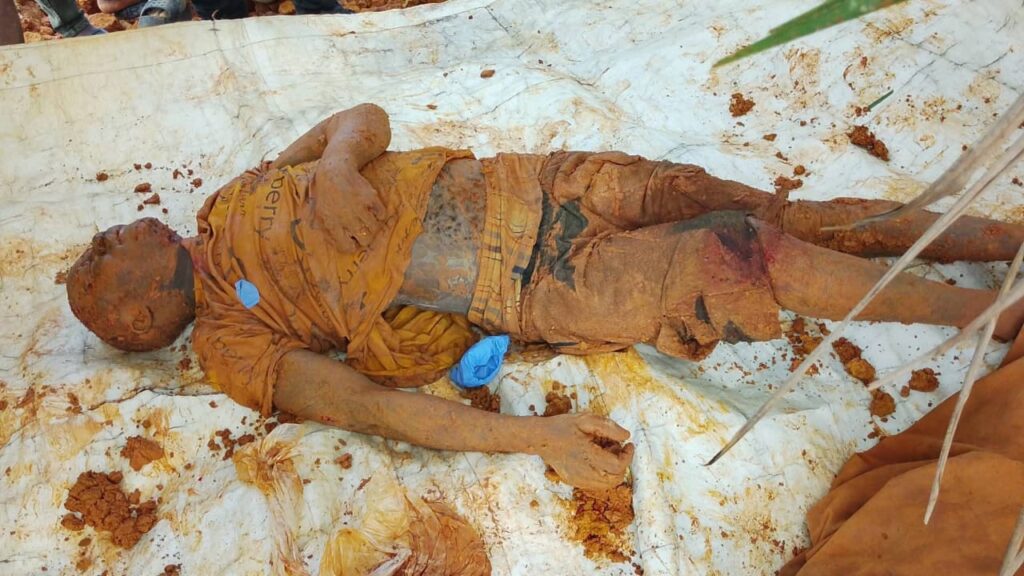By Ernest Kpehe Moibah | Bomi County Correspondent
A chilling sense of fear and grief grips the small mining community of Mambo Camp Two in Klay District, Bomi County after the tragic death of local miner Soko Smith, who was buried alive when loose dirt caved in at a mining pit.
The Camp Master, Julius Kerkula, has described the town as “a death trap” and is calling on the national government and local authorities to immediately relocate the community to avoid another tragedy occurs.
“We can’t continue living like this,” Kerkula said, standing near the site of the fatal collapse. “Our people are dying in these pits, our houses are cracking, and we don’t even have clean drinking water. We need help — we need relocation”, Camp Master lament.
A Death That Shook the Town
The late Soko Smith, a young miner known for his hard work, lost his life deep underground after a section of loose dirt gave way, trapping him beneath the gravels.
In a heart wrenching account, George Anthony, a fellow miner who witnessed the tragedy, recounted the horrifying moment.
“When the dirt fell on Soko, we tried to save him,” Anthony said. “We suggested using a machine to pull the gravel and rescue him. But some of the men got scared—they thought the pit would collapse again—so they ran away. They left him there.”
Smith’s muffled cries echoed for a few moments before silence fell. Anthony described it as the most terrifying sound he’s ever heard — one that still haunts him.

Mining Without Safety—Or Sobriety
In a sobering revelation, Anthony admitted that most miners in the area often work under the influence of drugs or alcohol in order to overcome fatigue or fear.
“Sometimes, before we go down there, we take something to give us strength,” he confessed. “It helps us dig faster, but it also makes us careless.”
The tragedy underscores the harsh reality of Liberia’s artisanal mining sector, where lack of safety measures, absence of oversight, and sheer desperation push men to risk their lives daily for a handful of minerals that rarely change their fate.
Cracked Homes, Unsafe Water, and Fear of Collapse
Beyond the mining pits, Mambo Camp Two itself is crumbling literally. For more than two years, the community’s fragile homes have been battered by strong winds and storms, leaving walls cracked and roofs ripped off.
“Every time the breeze comes, it takes our zinc away,” Kerkula said. “We fix it, and the next time, it happens again. Our houses are breaking, our land is shaking. It’s like the whole place is falling apart.”
The camp master believes that the constant mining activity beneath the town may be weakening the ground, increasing the risk of more deadly collapses—not just in the mines, but in people’s homes.
“We are living on unstable soil,” he warned. “If nothing is done, one day this whole town could go down.”
No Safe Water—and No Money to Fix It
As if the cracks in their homes weren’t enough, residents are also facing a serious water crisis. The town’s only hand pump broke down five months ago, forcing families to drink from a nearby creek, the same source used by animals.
“We now go to the creek for water,” Kerkula said. “Sometimes, when it rains, we collect water in buckets. And if we’re lucky to get some money, we buy plastic bag water — but that’s rare.”
Local technicians have estimated that US$150 is needed to fix the pump, but the impoverished community has been unable to raise the amount.
“We’ve tried collecting money, but people can’t afford it,” Kerkula explained. “The little they make from mining goes to food or medicine. So, we’re drinking unsafe water. It’s killing us slowly.”
A Cry for Help
Kerkula and other residents are now pleading for immediate government and humanitarian intervention—not only to repair the water pump but to relocate the town entirely.
“If the government is ready, we can provide space for relocation,” the Camp Master said. “We are willing to move for our safety. We can’t keep burying people and pretending things are normal.”
A Community Forgotten in the Forest
Mambo Camp Two, home to more than 200 residents, stands today as a haunting reminder of Liberia’s forgotten mining communities where citizens dig through danger to survive, while help remains out of reach.
The death of Soko Smith has reignited calls for stronger regulation of artisanal mining, better safety training, and government attention to the deepening humanitarian needs of people in rural mining regions.
“We are tired of crying,” Kerkula said, his voice breaking. “We are tired of living in fear. We need help — not tomorrow, but now.”
With cracked houses above and collapsing mines below, Mambo Camp Two is quite literally sitting on a disaster waiting to happen. And unless action is taken soon, residents fear that Soko Smith’s death may not be the last.




8 Comments
pesomaxfun https://www.elpesomaxfun.com
Понятие гедонизма — это направление в философии, которое ставит удовольствие в центр человеческой жизни.
Согласно этому взгляду, желание получать позитивные эмоции считается значимой частью существования.
Гедонизм не всегда подразумевает чрезмерность.
Во многих трактовках он связан с умеренностью и контроль желаний.
https://www.tumblr.com/sneakerizer/803900828117336064/%D0%BA%D1%80%D0%BE%D0%B9-2026-%D0%BA%D0%BE%D0%B3%D0%B4%D0%B0-%D0%BE%D0%B4%D0%B5%D0%B6%D0%B4%D0%B0-%D1%83%D1%87%D0%B8%D1%82%D1%81%D1%8F-%D0%B4%D1%8B%D1%88%D0%B0%D1%82%D1%8C-%D0%B2%D0%BC%D0%B5%D1%81%D1%82%D0%B5-%D1%81
Актуальная интерпретация часто акцентирует внимание на эмоциональном благополучии.
При этом важную роль играет гармония между удовольствиями и реальными возможностями.
Эта философия может способствовать личному развитию.
Таким образом, гедонизм рассматривается как один из способов осмысления жизни, а не как безусловное потакание желаниям.
Being well-dressed is significant for creating a positive impression.
A thoughtful appearance helps express personality.
A neat look can improve self-esteem.
In everyday life, appearance often shapes first impressions.
https://rentry.co/uzcvidx7
Carefully selected clothing make professional interactions smoother.
It is important to consider individual taste as well as the situation.
Modern styles give people the chance to refresh their image.
In conclusion, dressing stylishly supports a complete personal image.
Продуманный внешний вид является значимым фактором в формировании впечатления.
Она помогает подчеркнуть индивидуальность и ощущать комфорт.
Аккуратный внешний вид создаёт первое впечатление окружающих.
В повседневной жизни одежда может придавать уверенность.
https://graph.org/Celine-01-12-2
Хорошо подобранная одежда облегчает социальные взаимодействия.
При выборе вещей важно учитывать личные предпочтения и обстановку.
Мода дают возможность находить новые решения.
В итоге, умение стильно одеваться делает образ завершённым.
Продуманный внешний вид имеет большое значение в формировании впечатления.
Она помогает подчеркнуть индивидуальность и выглядеть гармонично.
Современный стиль влияет на восприятие окружающих.
В повседневной жизни одежда может повышать самооценку.
https://rentry.co/ciet6yma
Продуманный гардероб облегчает социальные взаимодействия.
При выборе вещей важно учитывать личные предпочтения и уместность ситуации.
Современные тенденции дают возможность находить новые решения.
В итоге, умение стильно одеваться делает образ завершённым.
Знакомство с новостными источниками является необходимым в информационном пространстве.
Оно помогает оставаться информированным и ориентироваться в ситуации.
Свежие материалы позволяют формировать собственное мнение.
Чтение СМИ способствует развитию критического мышления.
https://telegra.ph/Ekaterinburg-12-25
Разнообразные медиа помогают видеть картину шире.
В профессиональной сфере СМИ дают возможность оставаться конкурентоспособным.
Внимательное чтение новостей формирует информационную грамотность.
В итоге, чтение СМИ делает человека более информированным.
Стильно одеваться необходимо для самовыражения.
Внешний вид помогает подчеркнуть индивидуальность и повышает уверенность.
Продуманный стиль создаёт впечатление окружающих.
В повседневной жизни одежда может придавать внутреннюю собранность.
https://telegra.ph/Versace-12-29-10
Хорошо сочетаемая одежда упрощает социальные взаимодействия.
При выборе стиля важно учитывать личные предпочтения и контекст.
Актуальные направления позволяют находить новые решения.
В итоге, умение стильно одеваться положительно влияет на самоощущение.
Регулярное выполнение домашних заданий является ключевым элементом в учебной деятельности.
Домашняя работа способствует усвоить материал и повысить уровень понимания.
Благодаря этому ученики совершенствуют дисциплину.
Регулярные задания помогают научиться эффективно управлять временем.
https://resh.me/5-klass/matematika/vilenkin-zhohov/
Кроме того, домашняя работа формирует умение принимать решения.
Школьники чувствуют себя спокойными на занятиях.
Постепенно выполнение заданий положительно влияет на общую успеваемость.
В итоге домашние задания играют значимую роль школьного обучения.